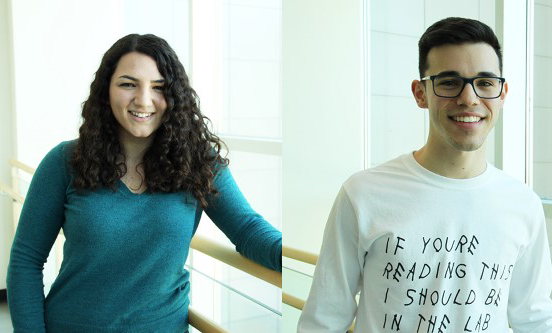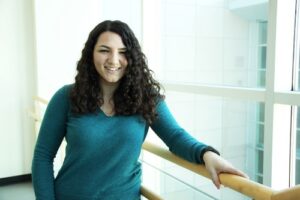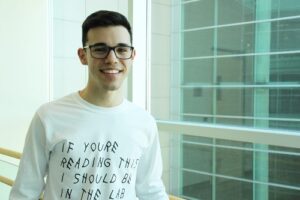Two IIDR Trainees Receive Prestigious NSERC URSA Award

IIDR’s Maddy Rudolph and Daniel Celeste were recently awarded with an Undergraduate Student Research Award (USRA) from the Natural Sciences and Engineering Research Council of Canada (NSERC).
NSERC is the federal agency that promotes and assists research in the natural sciences and engineering. The USRAs are intended to stimulate interest in research in the natural sciences and engineering and to encourage students to undertake graduate studies and pursue a research career in these fields.
In total, there are 10 awards given to Faculty of Health Sciences students at McMaster University annually.
The USRA is valued at $4,500 and will support the salaries for Maddy and Daniel this summer. Learn more about our talented undergrads and how this award supports their fascinating research at the IIDR!
 Maddy Rudolph
Maddy Rudolph
Educational Background: Maddy Rudolph is an IIDR trainee in the Burrows Lab and a fourth year undergraduate student in the Biomedical Discovery & Commercialization (BDC) program at McMaster University. She started her undergraduate career in the Life Sciences program at McMaster and made the switch to Biochemistry. Her excellent experience in the lab made her decision to transition to the BDC program an easy one.
Research focus on bacteria biofilms could lead to new antibiotics: “Biofilms make bacteria more tolerant to antibiotics, and can act a bit like a physical shield preventing them from getting hit by the antibiotics. I try to understand how low levels of antibiotics stimulate biofilm formation, and my lab thinks it might be a stress response. When bacteria notice an antibiotic they freak out and try to protect themselves by throwing up their shields. I am trying to screen through different gene mutations in Pseudomonas, which is one of the common pathogens involved in cystic fibrosis infections. I’m trying find the genes that are required for the bacteria to show this biofilm stimulation. If we do that, we can potentially use the expression of these genes to detect new antibiotics.”
A head start: “This award means a lot to me because it’s the second year in a row I’ve received it. Last year, I was just starting out in the Burrows Lab and I was nervous about fitting in with the lab but because of the award, I had the opportunity to start my work there early. NSERC has given me the opportunity to have a longer project and be able to really dig into what I’m trying to do.”
IIDR’s supportive environment: “The IIDR supports trainees by providing relevant research experience and by pushing them to make relevant discoveries. There’s a really supportive environment from Postdocs, PhD students and Masters students. IIDR’s Trainee Day was the first time I ever presented a research poster. I love that the IIDR supports all students, including undergrads.
A variety of career options: “I’ve applied to a couple of medical schools and I applied to the BDC Masters program. There’s huge value in the internship as part of the BDC masters program. Whatever happens I’m happy. I think if I pursued the BDC program I would love to pursue marketing. There are some really cool opportunities in science that a lot of people don’t think about. Companies need people who can talk science. Whatever path I choose, I want to work in science, I want to work with people and I want to help people at the end of the day. As long as I’m doing those things I think I’ll be happy.”
 Daniel Celeste
Daniel Celeste
Educational background: Daniel Celeste is an IIDR trainee in the laboratory of Dr. Matthew Miller, entering his fourth undergraduate year in the Biomedical Discovery & Commercialization (BDC) program at McMaster University. Daniel started out at McMaster in the Life Sciences program. In his second year, he transitioned into Biochemistry and, based on his positive learning experience in this program and his attraction to the business side of the BDC program, he entered the BDC program in his third year.
Research focus from a universal flu vaccine to antibody diversification: “I did an independent research project in the lab last year looking at the antibody responses that children make to successive influenza vaccinations, which has to do with the arm of the Miller lab that’s working on a universal flu vaccine. I really enjoyed that research but would like to expand my repertoire during my USRA-funded summer position and senior thesis. I’m going to look at something pretty different, likely revolving around how humans generate diverse antibodies that can fight all sorts of infections. The process of antibody diversification is highly regulated – a lot can go wrong if it is not carried out properly – and, for that reason, I think it’s an amazing biological process. I’ll be looking at the role that the human helicase protein senataxin has in class-switch recombination, which is the process in antibody diversification that facilitates isotype switching (for example, from IgM to IgG). Bioengineered antibodies are useful in applications ranging from analytical techniques used in research to therapeutics for a variety of immunological diseases, so understanding how animals generate diverse antibodies may inform future synthetic techniques.”
A collaborative culture at the IIDR: “Being able to work so closely with supervisors who are performing high-impact research is an obvious benefit of being an IIDR trainee. The not-so-obvious part is that the culture around here is just amazing. I think there is a common stereotype that scientists are solitary, working alone all day in labs with no windows. Based on my experience in the lab, I have never felt like that because of the culture and team environment that is highly focused on collaboration and helping each other out. And it’s everyone – undergrads, grad students, postdocs, and supervisors. We’re such a cohesive team that I feel like those stereotypes do not hold true here.”
A career in the pharmaceutical industry: “I think that since joining the BDC program this past year I’ve gotten really excited about the pharmaceutical industry because of the way the competitive landscape works and the direction pharma is going in. My dream job is something that constantly challenges me and expands my knowledge – but as for whether that means clinical development, market access, consulting, or something else, how can I know for sure at this point? I want to work with people who are enthusiastic about being on the edge of human knowledge, bringing scientific discoveries to the masses to change lives.”
NewsRelated News
News Listing

McMaster Health Sciences ➚
Overcoming resistance: McMaster researchers find new utility for old antibiotics
News
January 6, 2025

December 19, 2024


